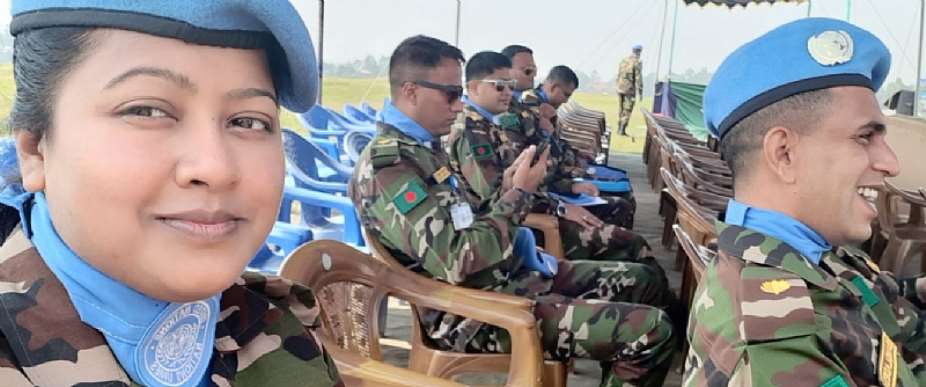This is the fourth part of our month-long campaign on celebrating female peacekeepers. 29 May is the International Day of UN Peacekeepers - a day to pay tribute to our uniformed and civilian personnel. As we commemorate the 20th anniversary of UN Security Council resolution 1325 on Women, Peace and Security, we are profiling female peacekeepers and hearing them tell their stories in their own words.
Can you tell us a bit about yourself?
I’m Major Nargis Parvin from the Bangladesh Army. I have been a soldier for 16 years now, focused on training, communication and intelligence gathering. I have also served in the United Nations (UN) twice, first in the UN Mission in Libya (UNMIL) from 2008 to 2009 and I’m currently with the UN Organization Stabilization Mission in the Democratic Republic of the Congo (MONUSCO).
What are your responsibilities in the mission and what is your typical day like?
Currently, I am the Military Staff Officer in the DDR/RR-CVR (Disarmament, Demobilization, Repatriation, Reintegration and Resettlement – Community Violence Reduction) Section in the Bunia Field Office. The job is not like regular military activities and it is challenging. I deal with different armed groups, both local and foreign, for their surrender procedure.
How long have you been a UN peacekeeper and how did you become one?
I served in Libya for one year and now I will be in the DRC for a year as well. How did I join the UN? I went through a selection procedure in the Bangladesh Army for tours of duty outside the army, including UN missions. I was selected on the basis of my work record, good reputation, length of service, skills and work experience. I also completed the necessary course for this task.
What did your family and friends back home think about your decision to leave your country and work for a UN peacekeeping mission?
My friends and family members are proud of me. They say I am doing a great job in the UN by helping the host country and its people achieve durable peace. I have all the support from my family, they are my strength.
What are three things you like most about the mission and the country?
I like that the security situation in the DRC is improving, with the help of MONUSCO. The disarmament process is ongoing. Besides that, I like the natural beauty of the country. It’s amazing.
What part of your job do you find most challenging and why?
Dealing with the combatants is the most challenging part of my job, but it is exciting at the same time. Combatants can be aggressive and so if you are handling them you need to follow the procedure, be cautious and considerate, bearing in mind that we are peacekeepers.
Do you think female peacekeepers serve as role models for the local population?
A big yes! And this is not only to the population, but also in the UN. Why do I say this? There are some tasks here that only women can do. For example, during disarmament, only female staff can attend to the female combatants or those surrendering.
What would you say to female soldiers considering a career in peacekeeping?
I would say congratulations because they are already doing a great job for humanity. They deserve a salute! We need a gender-balanced workforce to be more effective in implementing the UN mandate. One day, I would love to see a 50:50 male-female ratio.
For more information on COVID-19, visit www.un.org/coronavirus





 There’s nothing you can do for us; just give us electricity to save our collapsi...
There’s nothing you can do for us; just give us electricity to save our collapsi...
 Ghanaian media failing in watchdog duties — Sulemana Braimah
Ghanaian media failing in watchdog duties — Sulemana Braimah
 On any scale, Mahama can't match Bawumia — NPP Youth Organiser
On any scale, Mahama can't match Bawumia — NPP Youth Organiser
 Never tag me as an NPP pastor; I'm 'pained' the 'Akyem Mafia' are still in charg...
Never tag me as an NPP pastor; I'm 'pained' the 'Akyem Mafia' are still in charg...
 Your refusal to dedicate a project to Atta Mills means you never loved him — Kok...
Your refusal to dedicate a project to Atta Mills means you never loved him — Kok...
 2024 elections: I'm competent, not just a dreamer; vote for me — Alan
2024 elections: I'm competent, not just a dreamer; vote for me — Alan
 2024 elections: Forget NPP, NDC; I've the Holy Spirit backing me and nothing wil...
2024 elections: Forget NPP, NDC; I've the Holy Spirit backing me and nothing wil...
 2024 elections: We've no trust in judiciary; we'll ensure ballots are well secur...
2024 elections: We've no trust in judiciary; we'll ensure ballots are well secur...
 Performance tracker: Fire MCEs, DCEs who document Mahama's projects; they're not...
Performance tracker: Fire MCEs, DCEs who document Mahama's projects; they're not...
 Train crash: Railway ministry shares footage of incident
Train crash: Railway ministry shares footage of incident
